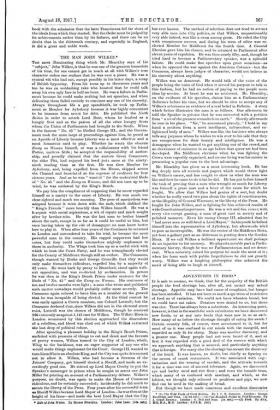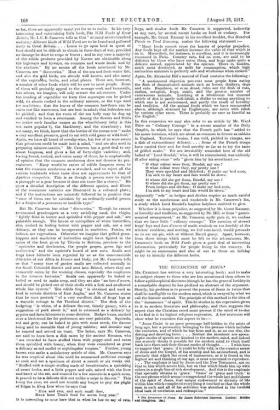ADVENTURES IN FOOD.•
Ir is safe to assume, we think, that for the majority of the British people the food shortage has, after all, not meant any actual shortage. Appetite may have had cause of complaint, but hunger has been satisfied. It has not been so much a question of restriction of food as of variation. We could not have wheaten broad, but we could have oat cakes. Potatoes were denied to us, but there was rice. There has always been a substitute. An interesting point, however, is that in thesearch for such substitutes we have discovered new foods, or at any rate foods that were new to us as such. How many of us before the shortage thought of eating the swede 1 Certain country folk, of course, were accustomed to it, but for most of us it was confused in our minds with the mangold, and regarded as only fit for sheep. Maize was another discovery, and a greater one. Many people had not even hoard of it, and at first it was regarded with a good deal of the reserve with which eve approach anything that is unusual, and particularly anything that is foreign. For many also the shortage hail meant the discovery of the lentil. It was known, no doubt, but chiefly as figuring on the menus of crank restaurants. It was associated with vege- tarianism and the wearing of aandals, and the attitude towards it for a time was one of am•rsed tolerance. Again, we discovered rye and barley meal and rice flour ; and oven the humble bran, which many of us confused with sawdust, and which, at the loftiest, we thought only referred to poultices and pigs, we now find can be used in the making of bread.
But though we have made numerous and excellent discoveries
• (I) The Wild Foods of Cent( Br:(aiw. By T. C R. Cameron. London: Georg. Boutledge and Som. lIced.netl--(21 roe Bendeed Pointe is Food Beoxoloy. Ny J. Grant Ramsay. London Bell and does. Ils. sail-0) Fond. By Sic.. sin.m.A., M.D. London: B.F.C.X. so far, there are apparently many yet for us to make. In his very intemsting and entertaining little book, The Wild Foods of Great Villein, Mr. I. C. R. Cameron tells us that" as many as two hundred noel sixty different kinds of Wild Food are to be found and gathered freely in Great Britain. . . . Leave to go upon land in quest of food should not be difficult to obtain in these days of war, provided no damage be done to crops or fences ; and in any case a majority of the edible products provided by Nature are obtainable along the highways and byways, on common and waste lands, and by the seashore." By no means all the foods mentioned by Mr. Cameron are " discoveries." Meet of the sea and fresh-water fish, and also the 'Rd birds, are already well known, and also many of. the vegetables, herbs, and salad plants. There are, however, a number of other foods which will be now to most people. Some of them will probably appeal to the average cook and housewife, but others, we imagine, will only attract the adventurer. trader the heading of vegetables we learn that asparagus can be picked wild, its shoots cooked in the ordinary manner, or the tops used for omelettes ; that the leaves of the common hawthorn can be eaten raw like watercress, but are best in salad ; that bulrushes can be pickled ; and that the roots of the sea holly may be dug up and candied to form a sweetmeat. Among the flowers and fruits we notice such familiar names as the whortleberry (why is this not more popular?), the blackberry, and the strawberry ; but not mosey, we think, knew that the berries of the rowan-tree " make F. very excellent preserve, good to eat with cold game or wild-fowl." Again, wo have all hoard of cowslip-wine, but few of us were aware that primroses could be made into a salad, " and are also, used in preparing minnow-tansies." Mr. Cameron has a good deal to any about fungusee, and given a list of forty-eight varieties ; and, leaving found, cooked, and eaten many of those, he is emphatically of opinion that the common mushroom does not deserve its pre- eminence. " Many would-be eaters of edible funguses seem to take the common mushroom as a standard, and to reject all the various toadstools whose taste does not approximate to that of slyaricus campeelria. This is as though a person were to reject a pineapple or• a pear because it does not taste like a cherry." He gives a detailed description of the different species, and fifteen of the commoner varieties are illustrated in a coloured plate ; and if the instructions are minutely followed he is positive that " nose of them can be mistaken by an ordinarily careful person for a fungus of a poisonous or inedible type."
But Mr. Cameron has other " discoveries." Though Ito cannot recommend grasshoppers as a very satisfying meal, the thighs, " lightly fried in butter and sprinkled with pepper and salt," are palatable enough. The larvae or caterpillars of white butterflies, also, cooked in boiling butter with pepper and salt, are a real delicacy, or they can be incorporated in omelettes. Fairies, we believe, are vegetarians. Otherwise we imagine that grilled grass- hoppers and omelettes of butterflies might have figured in the menu of the feast given by Titania to Bottom, previous to the " apricocks and dewberries, the purple grapes, green figs and mulberries," and the squirrel's hoard of now nuts. Snails and frogs have hitherto been regarded by as as the unaccountable delicacies of our Allioa ha France and Italy, yet Mr. Cameron tolls us that " many tone of garden snails are collected annually in the South Cotswold district and sent into Bristol, where they are commonly eaten by the working classes, especially the employees in the tobacco factories." Snails can apparently be baked or boiled or used to make soup, and they aro also "an hors &amuse, and should be picked out of their shells with a fork and swallowed whole like oyetera." The edible frog " is obtained and used as food in certain districts of East Anglia," and Mr. Cameron states that he once partook " of a very excellent dish of frogs legs at a wayeido cottage in the Thetford district." The flesh of the hedgehog " is white, of a delicate flavour, faintly gamey, with a suggeetion of pork about it," and is esteemed as a delicacy by gypaiea and farm labourers in some districts. Badger hams, smoked over a birchwood fire for preference, are very palatable. Squirrels, rod and grey, can be baked in pies with meat stock, the flavour being said to resemble that of young rabbits ; and dormice may be roasted and served on toast. The latter, says Mt. Cameron, are said to have been a dish eaten by the ancient Romans, who " are recorded to have stuffed them with poppy-seed and eaten them sprinkled with honey, when they were considered as great a delicacy as red mullet or nightingales' tongues." Further, young brown rats make a satisfactory article of diet. Mr. Cameron says he was sceptical about this until he summoned sufficient courage to cook and oat a specimen of about a month or Six weeks old. " Stuffed with a eimple stuffing made of breaderumbs, a sprinkling of sweet herbs, and a little pepper and salt, mixed with the liver and boort of the rat, and roasted for a few minutes in a quick oven, it proved to be a delicate dish not unlike a snipe in flavour." This tieing the case, we need not trouble any longer to pity the plight of Edgar in Bing Lear when he says that
" Mica and rats, and such small doer, Have boon Tom'e food for seven long year."
It is iuteresting to woo here that in what ha has to esy of rata, frogs, and similar foods Mr. Cameron is supported, indirectly at any rate, by several recent books on food or cookery. For example, Mr. Grant Ramsay in his excellent booklet, One Hundred Points in Food Economy, makes the following statement t-
" Many foods cannot cross the harrier of popular prejudice. Any foods kept off the market increase the value of that which is on it. Horse-fleshy for instance, is excellent, and it is increasingly consumed in Paris. Country rats, fed on corn, are said to be delicious by those who have eaten them, and frogs make quite a delicate morsel, appreciated by the epicure. There in besidee, much meat destroyed, as unfit for consumption, which high authorities maintain is perfectly safe and wholesome when cooked." Again, Dr. Alexander Hill's manual of 'Food contains the following
" A sentimental objection prevents meet people from eating the flesh of domesticated animals such as horsm, dot:drays, doge and cats. Repulsion, or es-on dread, rules out the flesh of rats, snakes, octopods, frogs, snails, and the greater number of carnivorous animals. Loathing of a wholesome but unusual article of diet is partly individual, a dislike to eating anything to which one is not accustomed, and partly the result of heredity and tradition. All the animal foods which we have enumerated above, although shunned by Englishmen, are oaten with relish by various other races. There is probably no race as fanciful as the English."
In this connexion we may also refer to an article by Mr. Ward Price on " Culinary Courage " in a recent number of the Daily Graphic, in which lee says that the French pouts has "added to his menu tortoises, which are about as common in Greece as rabbits in England. Tortoises' brains, I am told, pickled in ainegar, aro a dish of extraordinary delicacy.. . . Some of the. French troops have carried their zest for food novelty E. far as to try the taste of grilled snake." We are irresistibly reminded here of the old ballad of " Lord Randal," who, it will be remembered, was violently ill after eating some " eels " given him by his sweetheart t-
" 0 what colour were they, Renard, my son ?
O what colour were they, my pretty one ?
They were speckled and blotched ; 0 make nay bed soon, I'm sick to my heart and fain would lie down.
O where did she get them, Ronda], my son O where did she get them, my pretty one 1 From hedges and ditches ; 0 make my bed soon, I'm sick to my heart and fain would lie down."
Apparently " eels " in hedges and ditches require as much careful study as the mushrooms and toadstools in Mr. Cameron's list, a study which Lord Rendal's hapless ladylove omitted to give.
Whether it is from prejudice, as suggested by Mr. Grant Ramsay, or heredity and tradition, as suggested by Dr. Hill, or from " gastro- nomical arrangement," as Mr. Cameron aptly puts it, we confess that we have little " culinary courage." The mention of stewed frogs' legs and hors d'eruvre of snails reminds us too forcibly of the witches' cauldron, and nothing, we feel convinced, would persuade us to eat rat-pie, with or without Bovril gravy. Apart, however, from those things which must be left, to the adventurous, Mr. Cameron's book on Wild Foods gives a good deal of interesting information, particularly for people living in the country. It might be an amusement and also of use to those on holiday to try to identify the different herbs.



























 Previous page
Previous page